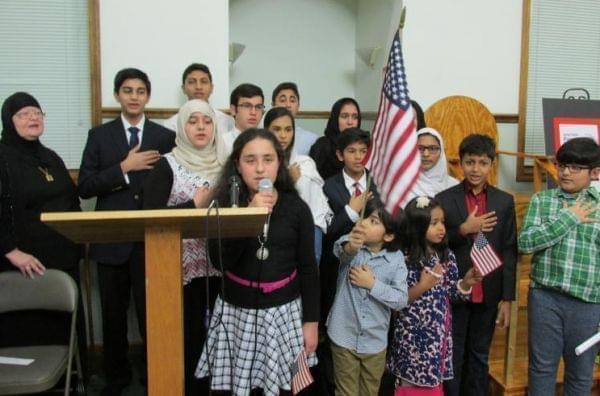On Combating Islamophobia In Illinois

Rachel Otwell/WUIS
This past weekend, over 200 people of various religions and ethnicities attended a Springfield prayer vigil. It honored the lives lost in Paris and San Bernardino. Muslim youth opened by singing the U.S National Anthem. Speakers included a rabbi, a Christian minister, and members of the Islamic Society of Greater Springfield.
Ali Nizamuddin is president of the board there, he welcomed the crowded room where most people sat shoe-less on the floor, and he brought some levity: "It was my idea for everyone to have chairs but I was overruled - because of the fact the organizers wanted you to know what it was like to have a traditional Islamic prayer."
Nizamuddin quickly took a more serious turn though: "When we stereotype people, place collective guilt for the actions of a few, then we undermine the American creed. And when politicians and demagogues talk about universal ID cards and data-bases and surveillance, things that the Nazis did to mobilize their base - then what does it say about our society?"
Politicians came to show support and they contributed to the theme of tolerance. Springfield mayor Jim Langfelder spoke about his family surviving the Holocaust. Democratic US Senator from Illinois Dick Durbin focused on the constitution: "You have a right to believe or not believe. That is your personal freedom, the government will not establish any religion. No official religion. There will be no official test for running for office."
However, political rhetoric is helping fan the flames of Islamophobia in the wake of violent acts by extremists. Republican Presidential candidate Donald Trump has magnified his presence in the national media spotlight by saying perhaps no Muslims should be allowed into the country at all.
Illinois GOP Governor Bruce Rauner, who said he would not allow Syrian refugees into the state after the Paris attacks, says Trump's idea is too extreme. However he did tell reporters earlier this month, "I have asked the Obama administration to take a pause - it's not a long term action, but a pause in our acceptance, our welcoming of refugees from Syria and Iraq, while we get a handle on our communication of whose coming - what checks have been done ... My number one job is to keep the people of Illinois safe."
Mohammad Al-Heeti is a Muslim business owner in Champaign-Urbana who has been targeted because of his ethnicity, and not just in the U.S. Last month,he says he was visiting family in Iraq and decided to stop in Rome with his daughter on the way back to the states. He says they were targeted by airport security who checked them several times. While at the gate, he and his daughter were approached by security for a fifth time. "At that moment she started crying. Because it exceeds the limit to be safe, now it's insulting."
Once they reached America though, Al-Heeti says that type of treatment ceased. While he has faced some discrimination while living in Illinois, he says it has been a good place to live. After his brother in Iraq was kidnapped and killed by radical extremists, sympathetic cards from people he didn't even know poured in. He says the community is supportive: "I don't want to complain. They come to my business, they help me to keep my business, they love my family - they love my children."
However, Islamophobia is tangible and quantifiable. Writer Mark Potok is with the Southern Poverty Law Center. He points to a study from earlier this year that says nearly 30% of Americans believe ISIS represents true Islamic religion.
"I would say at the end of the day, most Americans understand very, very little about the actual tenets of Islam, but they believe they know a great deal more than they do," says Potok. He has written about how hate crimes against Muslims increase following ISIS attacks, and could very well rise again in 2015. Concern over that trend led to the interfaith service.
Reverend Sara Isbell of the Chatham United Methodist Church was among the speakers. She says she doesn't want her religion to be defined by intolerant Christians in the public eye: "I find myself having to say what many of you have been having to say for years, every time this kind of thing occurs. Those people do not speak for me. They may claim the same religion, they may claim the same God but their words and deeds are about hate and violence and prejudice and they do not represent me."
As the prayer vigil wrapped up, the entire room broke into song, one that had been a staple in the civil rights movement: We Shall Overcome.

